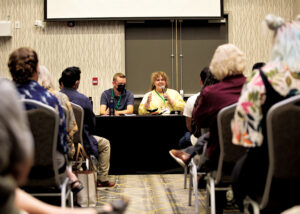“A person released from prison with a high risk to reoffend moves back into our communities. What can we do?”
This is a question Circles of Support and Accountability (CoSA) in Manitoba often asks in public-awareness and volunteer-recruitment efforts. It’s a challenge few accept, but a unique combination of life circumstances, the grace of God, and encouraging and loving people in my life led me to answer the call nearly four years ago.
CoSA is a community-based integration program steeped in restorative justice principles. It supports people coming out of prison who have requested help to live safer, healthier lives as they transition back into community. These people have often committed violent offences and are at a high risk to reoffend. They have many needs, and have few, if any, positive supports left in the community. CoSA forms circles of trained support volunteers around its core members—the people with criminal-offence histories—in an effort to prevent further victimization.
Besides the ultimate goal of preventing further victimization, it is the dream that all core members eventually mature out of their circle. When that point is reached, the circle members agree that a core member has developed a healthy network and positive skills and interests. Sometimes it includes a healthy, age-appropriate, committed relationship, but sometimes it doesn’t. Maybe it means a core member has become a member of a local church or synagogue, but maybe it doesn’t.
Unlike painting a house or building a fence, where progress is easily marked, and gratification from a job well done can come quickly, walking with people with offence histories can be difficult and tiring. Beyond their violent criminal records, many of our core members have entrenched negative thoughts and attitudes toward women as well as sexual and ethnic minorities. This has been frustrating to observe, and tricky to challenge, especially when dealing with a core member who is nearly twice my age.
Initially, as I got to know the core members involved with the program, it was easy for me to discover their humanity—their likable qualities, the parts of them that bring joy to others and the aspects that I can resonate with—because I share them as well.
As my relationships grew through trust and vulnerability, I began to better understand the paradoxical nature of reconciling the value of people with the wrong they have done. Instead of wrestling with this paradox, it can be easier to treat as “other,” people we fear or don’t understand. We prefer to pass judgment on them, and remain oblivious to the faults we carry and the pain we’ve caused others. I think this fear and this unwillingness to understand plays a major role in the general public’s attitude towards those involved with the prison system.
The work of restorative justice has allowed me to begin to understand what it takes to appreciate the inherent goodness of a person, while at the same time respect the gripping power a destructive pattern of behaviour can have. I continue to learn what it means to walk with a person who raped a young girl, or to support a person who, while inebriated, murdered his nine-week-old son.
The intense suffering my core members have caused others is something I will never be able to normalize. I do not know the sort of anguish, powerlessness and hurt my core members experienced that led them to commit such violent acts. However, I continue to nurture my empathy and my ability to distinguish the act from the person. This way, I can walk alongside them as a friend who looks deeper, so that the lovable, godly qualities that exist in them may be revealed and nurtured, and so that the powerful grip of an unhealthy behavioural cycle can loosen its hold.
Being involved with CoSA requires me to acknowledge my own brokenness. I cannot be expected to provide informed support and accountability to someone if I am unwilling to acknowledge my own weaknesses, past hurts and wrongdoings. In owning my own suffering, and the suffering I have caused others, I am able to be a helpful role model to those seeking to break out of cycles of violence. This has allowed me to stand in solidarity with those who have committed acts of great violence and say, “You are loved. Let me walk with you.”
Daniel Epp-Janzen, 25, is a program associate at CoSA. He attends Hope Mennonite Church, Winnipeg.
–Posted Feb. 12, 2014







Leave a Reply
You must be logged in to post a comment.